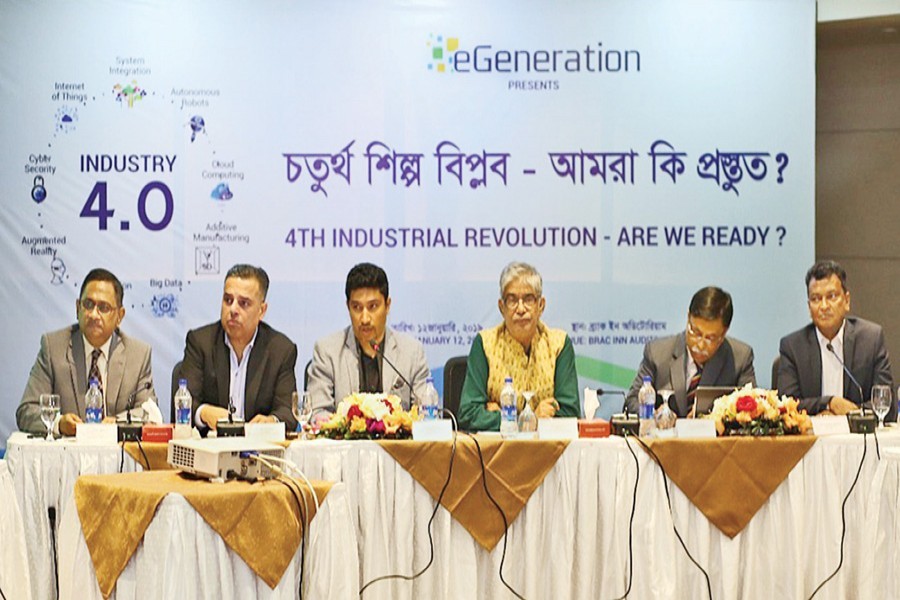
Published :
Updated :

Bangladesh needs to develop a Fourth Industrial Revolution (4IR) strategy on its own to cope with the next wave of global technological transformation, experts said on Saturday.
They also called for creating a pool of efficient human resources as well as a change in the corporate mindset for facing this ongoing technological revolution.
Their views came at a seminar on 'Fourth Industrial Revolution: Are We Ready' hosted by leading local IT company eGeneration in Dhaka city.
"It is time we develop a national strategy for Industry 4.0," said Ifty Islam, chairman of Asian Tiger Capital Partners, the country's leading private equity firm.
"China has already developed a national AI [artificial intelligence] master plan which is one of the most detailed and advanced in the world."
"We need something similar for Bangladesh as well," Mr Ifty, who previously worked for Deutsche Bank and Citigroup as top executive before forming the AT Capital, told the seminar.
The Oxford-graduate investment banker also noted that China is currently developing a 'Digital Silk Road' or 'Digital BRI' as part of its Belt and Road Initiative.
"We need to see how we can engage with this Digital Silk Road initiative of China," he added.
Such views are coming at a time when the impact of fourth IR is becoming a major concern not only for Bangladesh, but also globally.
The 4IR is characterised by emerging technologies like robotics, AI, nanotechnology, quantum computing, biotechnology, internet of things, 5G, additive manufacturing/3D printing and fully autonomous vehicles.
Experts often warn that the advent of such technologies, especially robotics and AI, may result in massive extinction of jobs which require repetitive manual labour.
In this context, speakers at the event called for developing a national strategy to outline future paths for making the country ready for the 4IR.
"We need to formulate a strategy along with an implementation plan," Mr Islam said, adding: "Corporate houses of the country also need to change their mindset."
Meanwhile, experts at the seminar also warned that failure to cope with the 4IR in time may lead to massive lay-offs at global and national levels.
"Two billion jobs will be displaced globally by 2030 as a result of technological advances," said Musfique Ahmed, a Bangladeshi-born international consultant.
He is working with digital governance schemes in the United Arab Emirates and Saudi Arabia.
"However, those who seize the upside will see a wealth of opportunities as proper use of automation can also result in 25-50 per cent cost savings," Mr Ahmed added.
"At local level, 60 per cent of the ready-made garment jobs, 35 per cent of leather-sector jobs and 20 per cent of tourism-sector jobs will go," said Md Mustafizur Rahman.
He is the project director of Access to Information (A2I) programme of the Prime Minister's Office.
"Around 1.4 million jobs of furniture industry as well as 0.6 million jobs of agro-processing industry will also vanish," said Mr Rahman quoting a recent study done under his A2I programme.
In this context, the speakers emphasised enhancing the skill base of the young workforce to make it compatible with future demands.
"Currently, there are huge skill shortages in the country when it comes to technology and analytics," said Maliha Quadir, founder and managing director of Shohoz, a major ride-sharing startup.
"So, we have to put a lot of emphasis on skill development," she said, calling for a concentrated strategy to bring back and utilise the Bangladeshi talent living abroad.
The speakers also stressed a policy environment conducive to fostering necessary innovations needed to cope with the upcoming technological transformation.
"There can be no innovation without financing. And we need to develop a proper ecosystem to foster such innovation," said Shawkat Hossain, managing director of BD Venture Limited.
Dhaka Chamber of Commerce and Industry president Osama Taseer called for implementing a pilot project to see how the 4IR can help the local RMG industry become more productive, effective and cost-efficient.
Speaking on the occasion, telecoms and ICT minister Mustafa Jabbar called for utilising the country's demographic dividend to reap the benefits of the 4IR.
"The advent of new technology doesn't necessarily mean massive job losses for Bangladeshis," he uttered.
"Rather, we can lead the world in fourth industrial revolution through using our young talented workforce," the minister said.
He, however, highlighted the need for improving the standards of education and enhancing the skill base to cope with the new technological changes.
"Previous industrial revolutions resulted in greater social and economic disparity. We need to see the same doesn't happen with the 4IR," Mr Jabbar said.
"Our businesses also need to be ready for the fourth industrial revolution and that requires a big change in the mindset," he added.
Mutual Trust Bank Limited managing director Anis A Khan and eGeneration chairman Shameem Ahsan also spoke.
mehdi.finexpress@gmail.com


 For all latest news, follow The Financial Express Google News channel.
For all latest news, follow The Financial Express Google News channel.